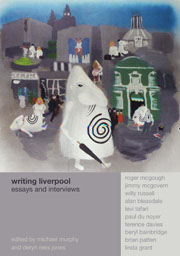Book contents
- Frontmatter
- Contents
- Acknowledgements
- List of Contributors
- Dedication
- Introduction: Sounding Liverpool
- 1 George Garrett, Merseyside Labour and the Influence of the United States
- 2 ‘No Struggle but the Home’: James Hanley's The Furys
- 3 Paradise Street Blues: Malcolm Lowry's Liverpool
- 4 ‘Unhomely Moments’: The Fictions of Beryl Bainbridge
- 5 A Man from Elsewhere: The Liminal Presence of Liverpool in the Fiction of J.G. Farrell
- 6 The Figure in the Carpet: An Interview with Terence Davies
- 7 ‘Every Time a Thing Is Possessed, It Vanishes’: The Poetry of Brian Patten
- 8 Finding a Rhyme for Alphabet Soup: An Interview with Roger McGough
- 9 Rewriting the Narrative: Liverpool Women Writers
- 10 Jumping Off: An Interview with Linda Grant
- 11 Ramsey Campbell's Haunted Liverpool
- 12 ‘We Are a City That Just Likes to Talk’: An Interview with Alan Bleasdale
- 13 ‘Culture Is Ordinary’: The Legacy of the Scottie Road and Liverpool 8 Writers
- 14 ‘I've Got a Theory about Scousers’: Jimmy McGovern and Lynda La Plante
- 15 Manners, Mores and Musicality: An Interview with Willy Russell
- 16 Subversive Dreamers: Liverpool Songwriting from the Beatles to the Zutons
- 17 Putting Down Roots: An Interview with Levi Tafari
- 18 ‘Out of Transformations’: Liverpool Poetry in the Twenty-first Century
5 - A Man from Elsewhere: The Liminal Presence of Liverpool in the Fiction of J.G. Farrell
- Frontmatter
- Contents
- Acknowledgements
- List of Contributors
- Dedication
- Introduction: Sounding Liverpool
- 1 George Garrett, Merseyside Labour and the Influence of the United States
- 2 ‘No Struggle but the Home’: James Hanley's The Furys
- 3 Paradise Street Blues: Malcolm Lowry's Liverpool
- 4 ‘Unhomely Moments’: The Fictions of Beryl Bainbridge
- 5 A Man from Elsewhere: The Liminal Presence of Liverpool in the Fiction of J.G. Farrell
- 6 The Figure in the Carpet: An Interview with Terence Davies
- 7 ‘Every Time a Thing Is Possessed, It Vanishes’: The Poetry of Brian Patten
- 8 Finding a Rhyme for Alphabet Soup: An Interview with Roger McGough
- 9 Rewriting the Narrative: Liverpool Women Writers
- 10 Jumping Off: An Interview with Linda Grant
- 11 Ramsey Campbell's Haunted Liverpool
- 12 ‘We Are a City That Just Likes to Talk’: An Interview with Alan Bleasdale
- 13 ‘Culture Is Ordinary’: The Legacy of the Scottie Road and Liverpool 8 Writers
- 14 ‘I've Got a Theory about Scousers’: Jimmy McGovern and Lynda La Plante
- 15 Manners, Mores and Musicality: An Interview with Willy Russell
- 16 Subversive Dreamers: Liverpool Songwriting from the Beatles to the Zutons
- 17 Putting Down Roots: An Interview with Levi Tafari
- 18 ‘Out of Transformations’: Liverpool Poetry in the Twenty-first Century
Summary
Indroduction: locating Liverpool
James Gordon Farrell was born in Liverpool on 25 January 1935 and christened five weeks later on 3 March at the Church of St Mary the Virgin in West Derby. His family, on both sides, had strong Liverpool connections, as Lavinia Greacen details in her excellent biography, J.G. Farrell: The Making of a Writer, though neither family had deep Liverpudlian roots. On his father's side the O'Farrells had emigrated from Ireland, dropping the prefix – which identified them as Irish and, misleadingly, as Catholic – when they settled in Liverpool. Farrell's grandfather, Thomas James Farrell, was a successful wine and spirit merchant; his father, William (Bill), born in 1900, was, in Greacen's words, ‘shaped by the red-bricked certainties of turn-of-the-century Liverpool’. Bill grew up in Kremlin Drive in Stoneycroft, a respectable suburb, but close enough to the docks for Bill to feel ‘the pulse of an invisible empire’, a pulse that would later beat through Farrell's three major novels, Troubles (1970), The Siege of Krishnapur (1973), and The Singapore Grip (1978), commonly, though somewhat inaccurately, referred to as his ‘empire trilogy’, and, in more muted fashion, through his unfinished novel, posthumously published as The Hill Station (1981). The Russells on his mother's side journeyed in a contrary direction, moving from London to Liverpool, where her grandfather, a ship's captain, was based until his retirement; her father, inspired by the successful example of an uncle, emigrated to Ireland. For Farrell, Ireland seemed destined to be mediated through Liverpool.
Information
- Type
- Chapter
- Information
- Writing LiverpoolEssays and Interviews, pp. 88 - 104Publisher: Liverpool University PressPrint publication year: 2007
